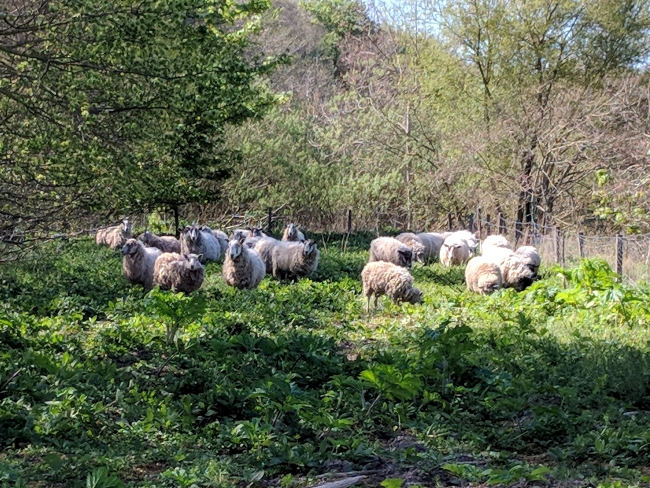Woolly warriors battle invasive species!

A flock of woolly warriors were introduced by the Scottish Invasive Species Initiative into woodland alongside the River Deveron to munch their way through invasive giant hogweed plants. The Initiative is led by NatureScot and funded by the National Lottery Heritage Fund, NatureScot and by in-kind support from project partners and volunteers.
The sheep were introduced into the strip of woodland along the river beyond the Macduff distillery as part of a hogweed grazing trial in 2019. Giant hogweed is one of the most notorious invasive non-native species in the UK. Not only is it highly invasive and easily spread – each seed head can produce 20-50,000 seeds, all potentially viable for up to 10 years – but it also contains a phytotoxic sap within its leaves and stems which can cause severe skin burns to humans.
An infested site must be treated consistently for many years (sometimes 10 or more) to fully exhaust the seedbank. Infested sites are normally treated by spraying pesticides onto the leaves of the plants and by cutting flowering heads to prevent further seed production. Over time, this will kill off the infestation and deplete the seedbank in the soil. However, this can be time consuming, costly and physically challenging – especially in difficult terrain.
However, once familiar with the plant, sheep will readily and even preferentially graze on giant hogweed with no adverse effects from the sap. Over time, grazing depletes the resources stored in the plant’s taproot and eventually kills it off.
Dan Gordon, landowner of the Macduff trial site, commented, “It’s amazing to see the progress made over the last four years. The giant hogweed was completely dominating the woodland and would have been really tricky and costly to deal with using pesticides. The Scottish Invasive Species Initiative provided a very welcome opportunity to try an alternative approach - I’m really pleased with the results.”
Monitoring the effect of the sheep on both giant hogweed and native vegetation has been an integral part of the trial. The full case study, detailing our management strategy and monitoring results, can be found here.
Karen Muller, the Project Officer managing this work, said, “The monitoring undertaken was really important as it allowed us to adjust our grazing regime each year and find the right balance between grazing the giant hogweed and avoiding overgrazing - thereby protecting native plant species. We reduced grazing pressure over the first few years and settled on a regime that controlled giant hogweed with limited impacts on native flora.”
The lessons learnt and knowledge gained in this trial have been collated into management guidance available here. This includes an overview of the Macduff trial, management considerations and key tips for success – everything from what type of sheep were used, what time of year to deploy sheep on a site, how to reduce the risk of overgrazing and key things to look for when monitoring progress.
Project Manager Callum Sinclair said: “We are delighted to share this management guidance and hope it will help to inform and encourage others interested in using sheep grazing as a sustainable, long-term method of giant hogweed control. We’d especially like to thank Dan Gordon from Kirkside Farm and our colleagues at the University of Aberdeen for their commitment, hard work and support on this project at Macduff.”
This week is Invasive Species Week, raising awareness of the negative impact of invasive, non-native species in the UK. Invasive non-native species are one of the top five drivers of global biodiversity loss. In Scotland, they threaten the survival of native wildlife, damage our natural ecosystems, cost the economy nearly £246 million a year, and can even harm our health and interfere with activities we enjoy.
The Scottish Invasive Species Initiative is working with local communities and volunteers to control giant hogweed and several other key invasive plants and the American mink across northern Scotland. For more information about the work of the project or to find out about volunteering opportunities, visit the website www.invasivespecies.scot, follow the project on social media or email sisi@nature.scot.


